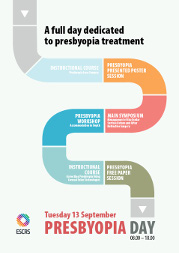Posters
Cornea plana
Poster Details
First Author: S. Dikova BULGARIA
Co Author(s): V. Chernodrinska A. Georgieva S. Dragoev
Abstract Details
Purpose:
The purpose of the study is to present a case of Cornea Plana and to discuss the possible difficulties encountered during the diagnostic process and the treatment plan. Cornea Plana is a rare congenital pathology of the eye, which can be accompanied by a number of complications: high refractive errors, amblyopia, glaucoma, early onset of cataract, etc.
Setting:
The patient is a 7-years old heathy child, who was brought for a prophylactic eye check, with the sole complaint of not seeing clearly the board at school. The examination was held in Children’s Eye Hospital “Visus” and Specialized Eye Hospital “Zora” in Sofia, Bulgaria.
Methods:
The initial examination comprehended: AR, BCVA before and after cycloplegia, skiascopy, orthoptic status, slit lamp examination and ophthalmoscopy. An attempt to make a Javal examination and AR was made, but without any result. In spite of the challenging age of the patient and the rare corneal condition, an a-scan and pachimetry were successfully performed. The results were nearly confirmed with a topography (pentacam) and biograph examination done later on. IOP, measured with a non-contact tonometry, gave inconsistent results, but within the normal range (12-22mmHg). Goldman tonometry was not successfully performed due to the child bad compliance.
Results:
Skiascopy: OD=12/13D. OS=15/15D. BCVA OD=20/60 with +7,00D. OS<20/200 with +9,00D. Digital biometric ruler: AxL: OD=23,17mm OS=22,6mm; CCT: OD=551mM OS=518mM. Biograph AxL: OD=23,02mm(SD=0,006) OS=22,15mm(SD=0,019); CCT OD=566mM(SD=3,7) OS=527mM(SD=4,3); OD: K1=31,20D(SD=0.061) K2=32,33D(SD=0,317) OS: K1=K2=error. Pentacam: OD: K1=29,4D K2=30,8D; OS: K1=26,5D K2=28,9D: CCT: OD=504mM OS=469mM. Pentacam also showed results suspicious for keratoconus for the right eye. IOP OD=OS<21mmHg. Fundus - no abnormal findings.
Conclusions:
This case shows a significant problem in correction of the high hypermetropia and, consequently, in managing the heavy amblyopia. No contact lenses or refractive surgery is possible. Patients with Cornea Plana develop an early onset cataract and often glaucoma. The struggle in measuring the IOP, comes not only from the young age and bad compliance of the patient, but because neither of the methods give reliable results for the moment. At present, precise calculation of any type of IOL is almost impossible, due to the variable results of the different devices and the lack of appropriate formula.
Financial Disclosure:
NONE





